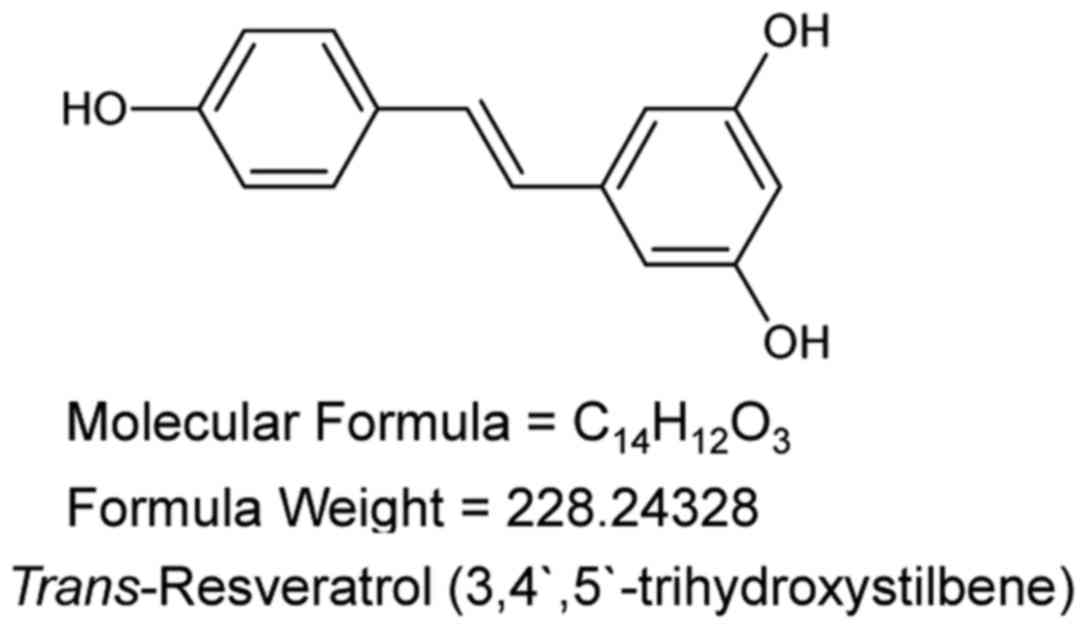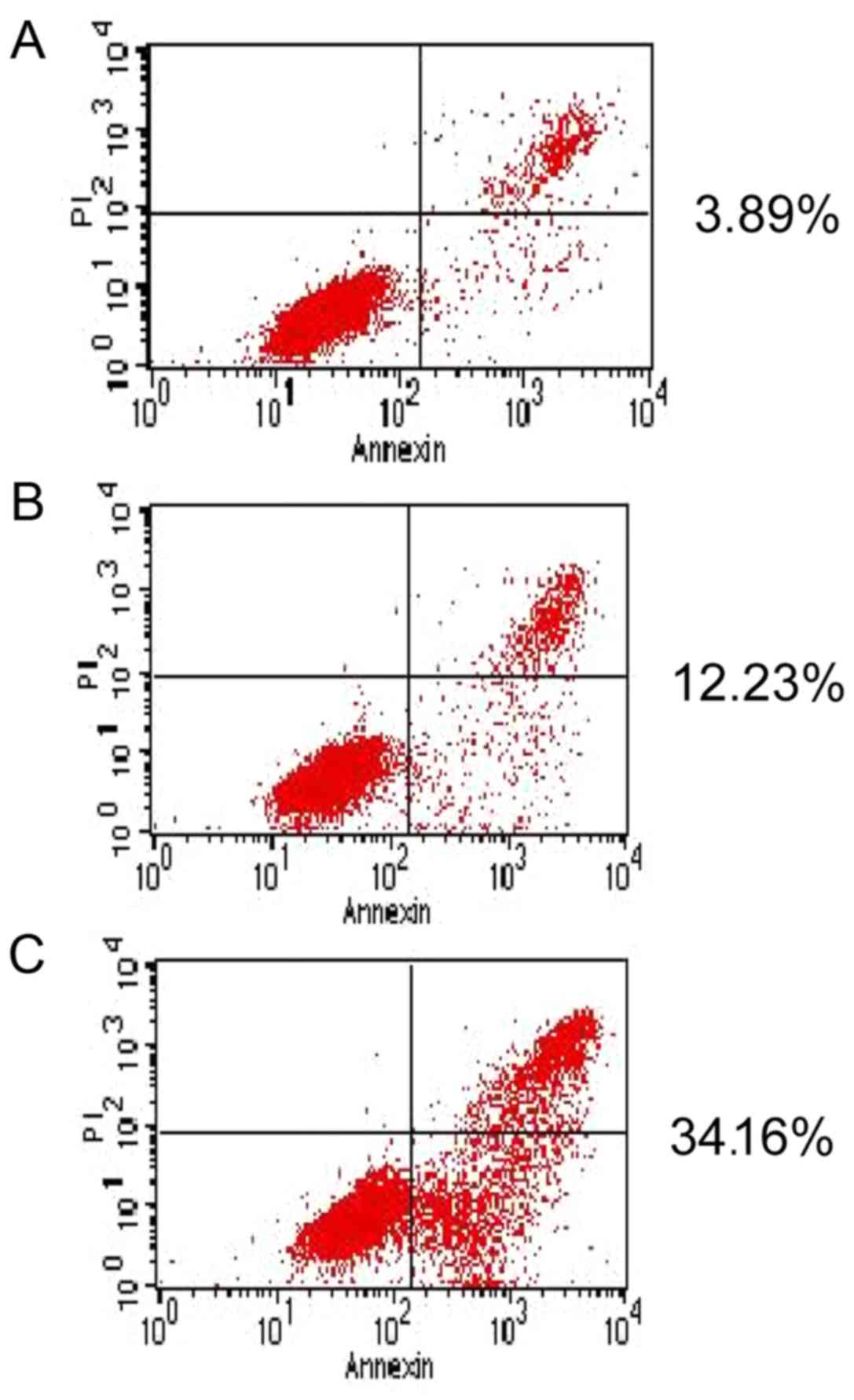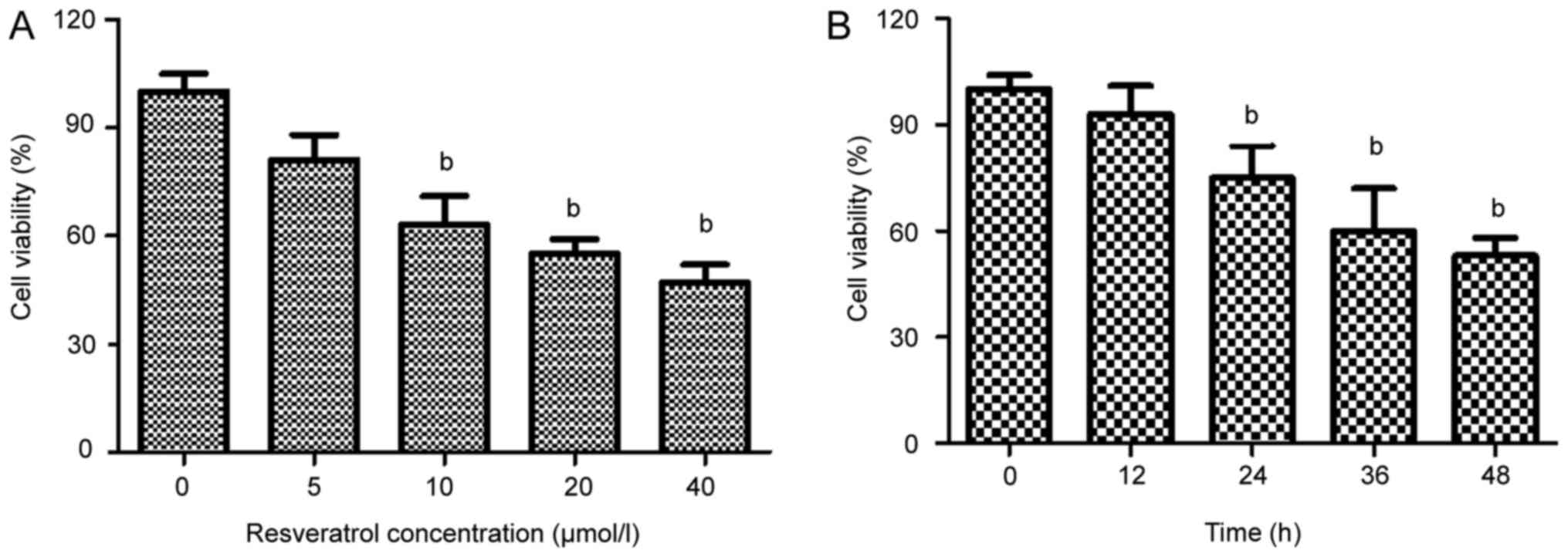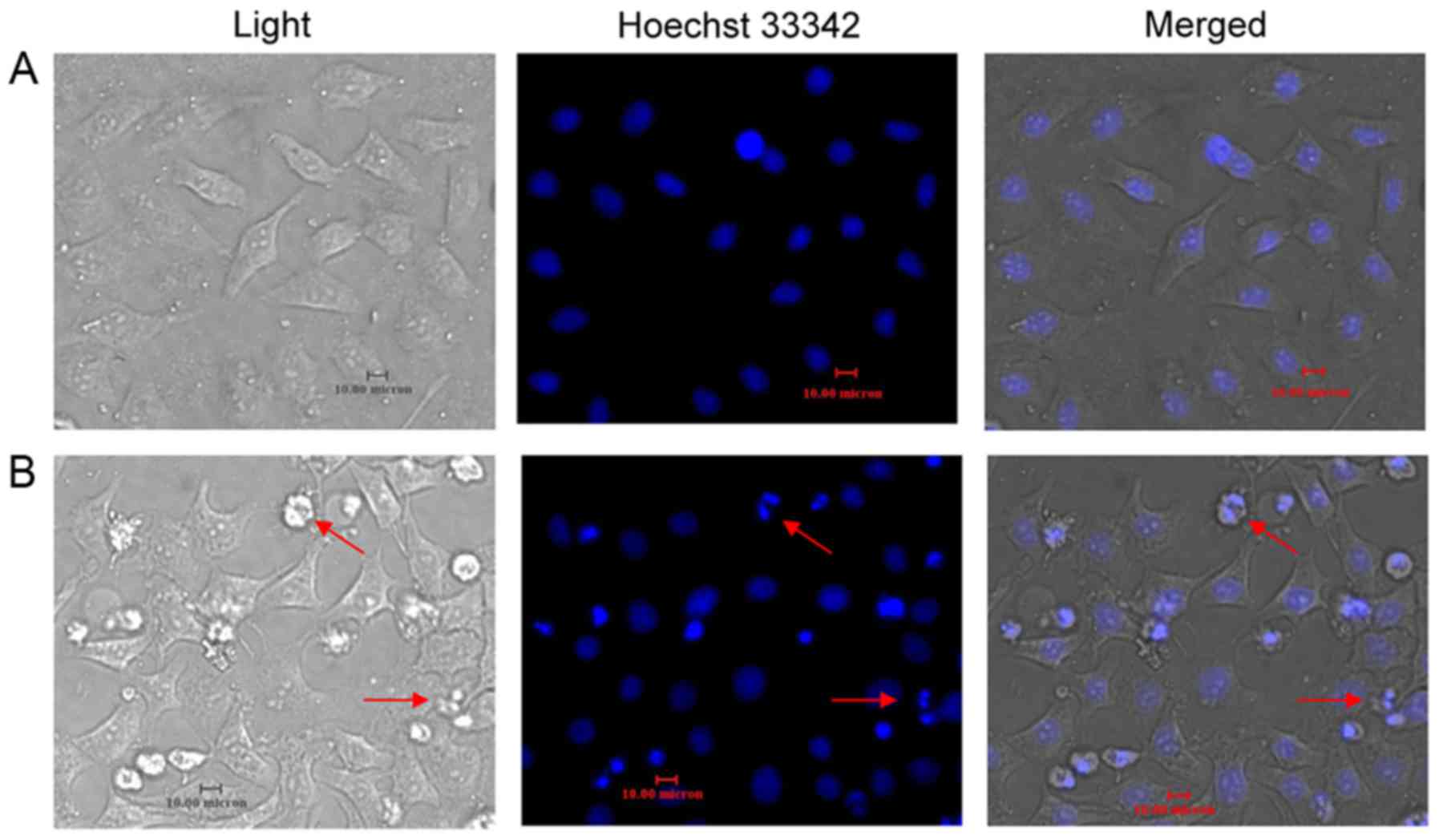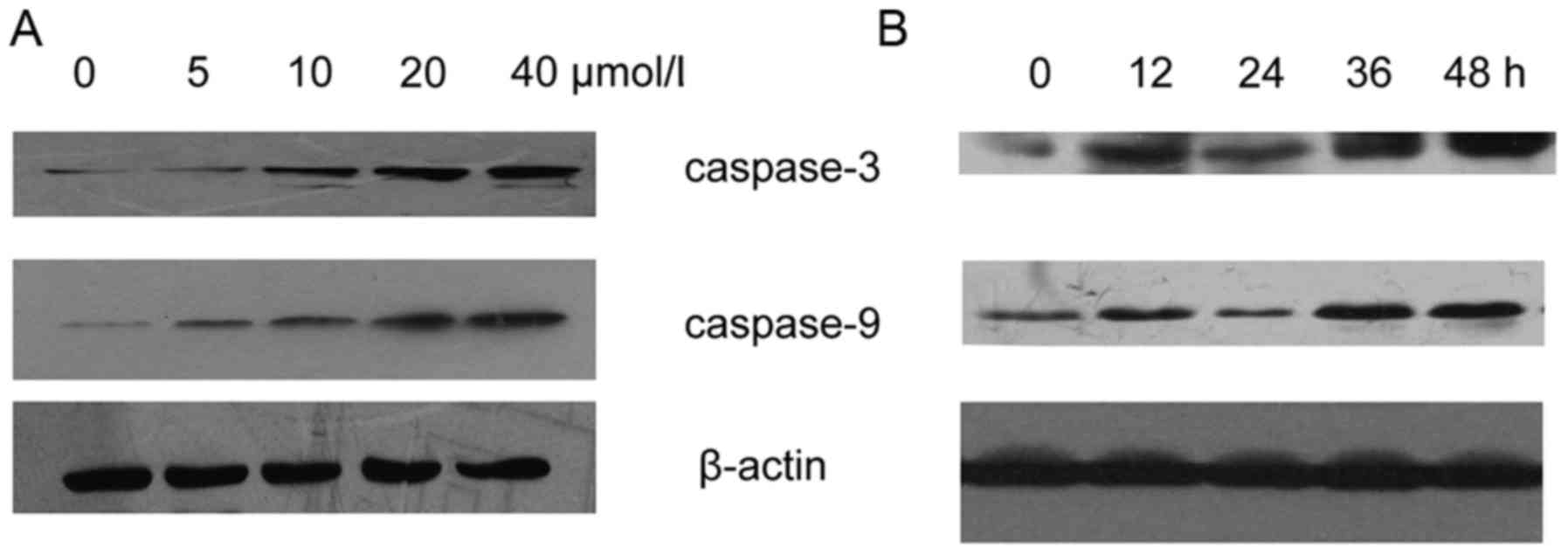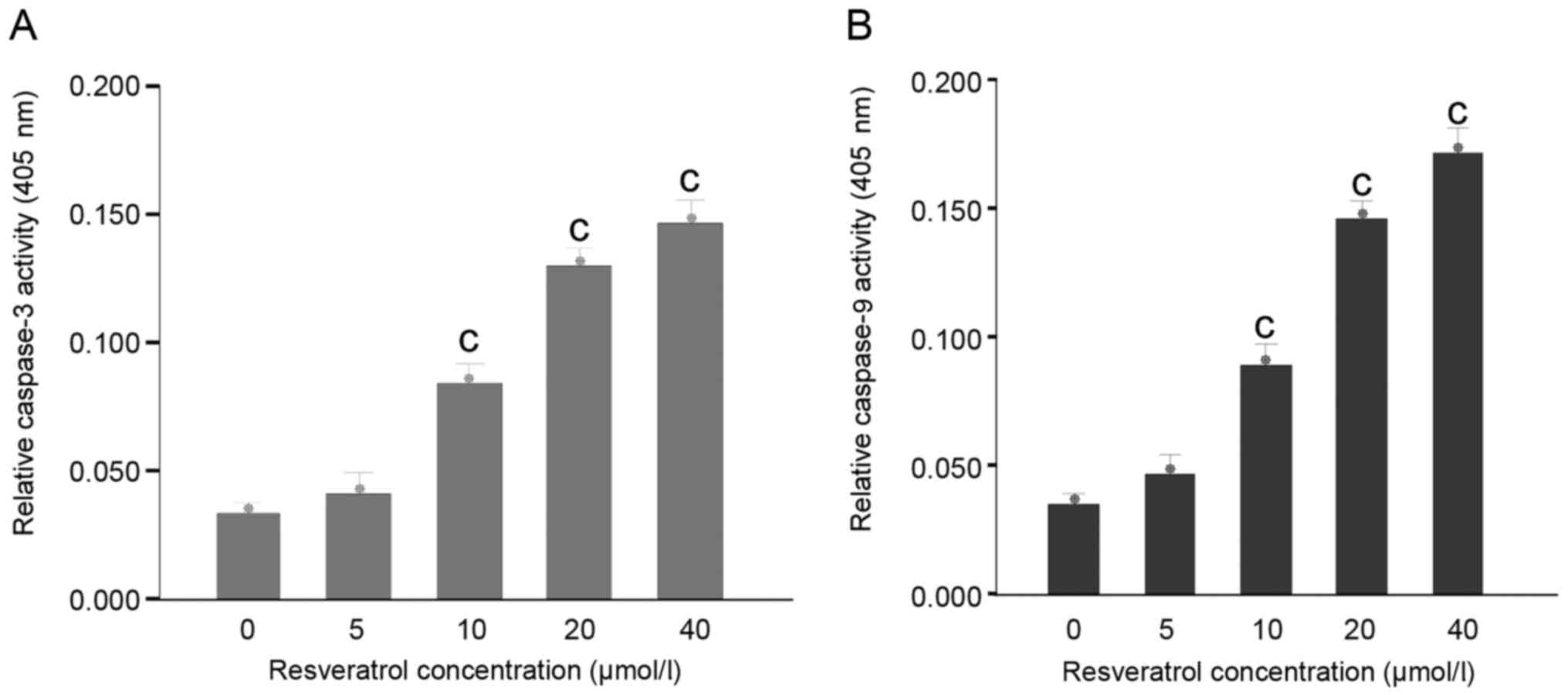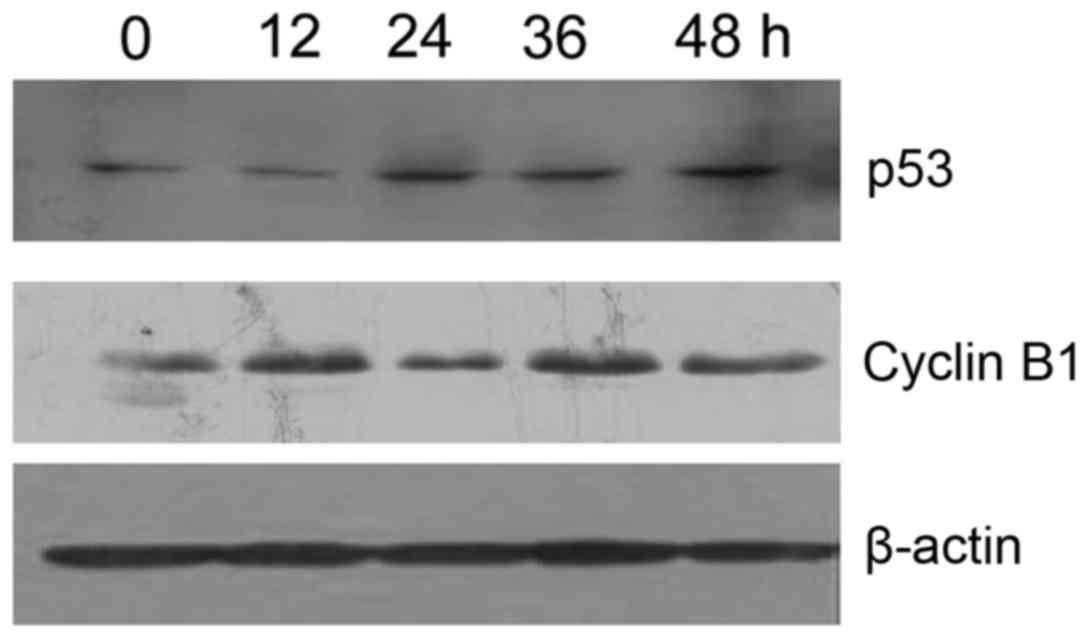|
1
|
Brisdelli F, D'Andrea G and Bozzi A:
Resveratrol: A natural polyphenol with multiple chemopreventive
properties. Curr Drug Metab. 10:530–546. 2009. View Article : Google Scholar : PubMed/NCBI
|
|
2
|
Pineda-Sanabria SE, Robertson IM and Sykes
BD: Structure of trans-resveratrol in complex with the cardiac
regulatory protein troponin C. Biochemistry. 50:1309–1320. 2011.
View Article : Google Scholar : PubMed/NCBI
|
|
3
|
Khurana S, Venkataraman K, Hollingsworth
A, Piche M and Tai TC: Polyphenols: Benefits to the cardiovascular
system in health and in aging. Nutrients. 5:3779–3827. 2013.
View Article : Google Scholar : PubMed/NCBI
|
|
4
|
Bollmann F, Art J, Henke J, Schrick K,
Besche V, Bros M, Li H, Siuda D, Handler N, Bauer F, et al:
Resveratrol post-transcriptionally regulates pro-inflammatory gene
expression via regulation of KSRP RNA binding activity. Nucleic
Acids Res. 42:12555–12569. 2014. View Article : Google Scholar : PubMed/NCBI
|
|
5
|
Fresco P, Borges F, Diniz C and Marques
MP: New insights on the anticancer properties of dietary
polyphenols. Med Res Rev. 26:747–766. 2006. View Article : Google Scholar : PubMed/NCBI
|
|
6
|
Singh CK, George SJ and Ahmad N:
Resveratrol-based combinatorial strategies for cancer management.
Ann N Y Acad Sci. 1290:113–121. 2013. View Article : Google Scholar : PubMed/NCBI
|
|
7
|
De Amicis F, Giordano F, Vivacqua A,
Pellegrino M, Panno ML, Tramontano D, Fuqua SA and Andò S:
Resveratrol, through NF-Y/p53/Sin3/HDAC1 complex phosphorylation,
inhibits estrogen receptor alpha gene expression via p38MAPK/CK2
signaling in human breast cancer cells. FASEB J. 25:3695–3707.
2011. View Article : Google Scholar : PubMed/NCBI
|
|
8
|
Damianaki A, Bakogeorgou E, Kampa M, Notas
G, Hatzoglou A, Panagiotou S, Gemetzi C, Kouroumalis E, Martin PM
and Castanas E: Potent inhibitory action of red wine polyphenols on
human breast cancer cells. J Cell Biochem. 78:429–441. 2000.
View Article : Google Scholar : PubMed/NCBI
|
|
9
|
Pandey PR, Okuda H, Watabe M, Pai SK, Liu
W, Kobayashi A, Xing F, Fukuda K, Hirota S, Sugai T, et al:
Resveratrol suppresses growth of cancer stem-like cells by
inhibiting fatty acid synthase. Breast Cancer Res Treat.
130:387–398. 2011. View Article : Google Scholar : PubMed/NCBI
|
|
10
|
Bae S, Lee EM, Cha HJ, Kim K, Yoon Y, Lee
H, Kim J, Kim YJ, Lee HG, Jeung HK, et al: Resveratrol alters
microRNA expression profiles in A549 human non-small cell lung
cancer cells. Mol Cells. 32:243–249. 2011. View Article : Google Scholar : PubMed/NCBI
|
|
11
|
Hsieh TC and Wu JM: Differential effects
on growth, cell cycle arrest, and induction of apoptosis by
resveratrol in human prostate cancer cell lines. Exp Cell Res.
249:109–115. 1999. View Article : Google Scholar : PubMed/NCBI
|
|
12
|
Li G, Rivas P, Bedolla R, Thapa D, Reddick
RL, Ghosh R and Kumar AP: Dietary resveratrol prevents development
of high-grade prostatic intraepithelial neoplastic lesions:
Involvement of SIRT1/S6K axis. Cancer Prev Res (Phila). 6:27–39.
2013. View Article : Google Scholar : PubMed/NCBI
|
|
13
|
Torre LA, Bray F, Siege RL, Ferlay J,
Lortet-Tieulent J and Jemal A: Global cancer statistics, 2012. CA
Cancer J Clin. 65:87–108. 2015. View Article : Google Scholar : PubMed/NCBI
|
|
14
|
Berridge MV, Herst PM and Tan AS:
Tetrazolium dyes as tools in cell biology: New insights into their
cellular reduction. Biotechnol Annu Rev. 11:127–152. 2005.
View Article : Google Scholar : PubMed/NCBI
|
|
15
|
Nicoletti I, Migliorati G, Pagliacci MC,
Grignani F and Riccardi C: A rapid and simple mothed for measuring
thymocyte apoptosis by propidum iodide staining and flow cytometry.
J Immonuol Methods. 139:271–279. 1991. View Article : Google Scholar
|
|
16
|
Khan A, Khan AA, Dwivedi V, Ahmad MG,
Hakeem S and Owais M: Tuftsin augments antitumor efficacy of
liposomized etoposide against fibrosarcoma in Swiss albino mice.
Mol Med. 13:266–276. 2007. View Article : Google Scholar : PubMed/NCBI
|
|
17
|
Fang J, Cai C, Wang Q, Lin P, Zhao Z and
Cheng F: Systems pharmacology-based discovery of natural products
for precision oncology through targeting cancer mutated genes. CPT
Pharmacometrics Syst Pharmacol. 6:177–187. 2017. View Article : Google Scholar : PubMed/NCBI
|
|
18
|
Soleas GL, Grass L, Josephy PD, Goldberg
DM and Diamandis EP: A comparison of the anticarcinogentic
properties of four red wine polyphenols. Clin Biochem. 35:119–124.
2002. View Article : Google Scholar : PubMed/NCBI
|
|
19
|
She QB, Bode AM, Ma WY, Chen NY and Dong
Z: Resveratrol-induced activation of P53 and apoptosis is mediated
by extracellular-single-regulated protein kinase and P38 kinase.
Cancer Res. 61:1604–1610. 2001.PubMed/NCBI
|
|
20
|
Surh YJ, Hurh YJ, Kang JK, Lee E, Kong G
and Lee SJ: Resveratrol, an antioxidant present in red wine,
induces apoptosis in human promyelocytic leukemia (HL-60) cells.
Cancer Lett. 140:1–10. 1999. View Article : Google Scholar : PubMed/NCBI
|
|
21
|
Clément MV, Hirpara JL, Chawdhury SH and
Pervaiz S: Chemopreventive agent resveratrol, a natural product
derived from grapes, triggers CD95 signaling-dependent apoptosis in
human tumor cells. Blood. 92:996–1002. 1998.PubMed/NCBI
|
|
22
|
Seeni A, Takahashi S, Takeshita K, Tang M,
Sugiura S, Sato SY and Shirai T: Suppression of prostate cancer
growth by resveratol in the transgenic rat for adenocarcinoma of
prostate (TRAP) model. Asisan Pac J cancer Prev. 9:7–14. 2008.
|
|
23
|
Liu H, Zang C, Fenner MH, Liu D, Possinger
K, Koeffler HP and Elstner E: Growth inhibition and apoptosis in
human Philadelphia chromosome-positive lymphoblastic leukemia cell
lines by treatment with the dual PPARalpha/gamma ligand TZD18.
Blood. 107:3683–3692. 2006. View Article : Google Scholar : PubMed/NCBI
|
|
24
|
Roy P, Kalra N, Prasad S, George J and
Shukla Y: Chemopreventive potential of Resveratrol in mouse skin
tumors through regulation of mitochondrial and PI3K/AKT signaling
pathways. Pharm Res. 26:211–217. 2009. View Article : Google Scholar : PubMed/NCBI
|
|
25
|
Kidd VJ: Proteolytic activities that
mediate apoptosis. Annu Rev Physiol. 60:533–573. 1998. View Article : Google Scholar : PubMed/NCBI
|
|
26
|
Kurokawa M and Kornbluth S: Caspases and
kinases in a death grip. Cell. 138:838–854. 2009. View Article : Google Scholar : PubMed/NCBI
|
|
27
|
Kook S, Zhan X, Cleghorn WM, Benovic JL,
Gurevich VV and Gurevich EV: Caspase-cleaved arrestin-2 and BID
cooperatively facilitate cytochrome C release and cell death. Cell
Death Differ. 21:172–184. 2014. View Article : Google Scholar : PubMed/NCBI
|
|
28
|
Xiong S, Mu T, Wang G and Jiang X:
Mitochondria-mediated apoptosis in mammals. Protein Cell.
5:737–749. 2014. View Article : Google Scholar : PubMed/NCBI
|
|
29
|
Liu J, Li Y, Ren W and Hu WX: Apoptosis of
HL-60 cells induced by extracts from Narcissus tazetta var.
chinensis. Cancer Lett. 242:133–140. 2006. View Article : Google Scholar : PubMed/NCBI
|
|
30
|
Hiraoka D, Aono R, Hanada S, Okumura E and
Kishimoto T: Two new competing pathways establish the threshold for
cyclin-B-Cdk1 activation at the meiotic G2/M transition. J Cell
Sci. 129:3153–3166. 2016.PubMed/NCBI
|
|
31
|
Pal HC, Sharma S, Elmets CA, Athar M and
Afaq F: Fisetin inhibits growth, induces G2/M arrest and
apoptosis of human epidermoid carcinoma A431 cells: Role of
mitochondrial membrane potential disruption and consequent caspases
activation. Exp Dermatol. 22:470–475. 2013. View Article : Google Scholar : PubMed/NCBI
|
|
32
|
Bhattacharya S, Ray RM and Johnson LR:
Cyclin-dependent kinases regulate apoptosis of intestinal
epithelial cells. Apoptosis. 19:451–466. 2014. View Article : Google Scholar : PubMed/NCBI
|
|
33
|
Zhang Z, Wang CZ, Du GJ, Qi LW, Calway T,
He TC, Du W and Yuan CS: Genistein induces G2/M cell cycle arrest
and apoptosis via ATM/p53-dependent pathway in human colon cancer
cells. Int J Oncol. 43:289–296. 2013. View Article : Google Scholar : PubMed/NCBI
|
|
34
|
Charrier-Savournin FB, Château MT, Gire V,
Sedivy J, Piette J and Dulic V: p21-mediated nuclear retention of
cyclin B1-Cdk1 in response to genotoxic stress. Mol Biol Cell.
15:3965–3976. 2004. View Article : Google Scholar : PubMed/NCBI
|
|
35
|
Chae SW, Sohn JH, Kim DH, Choi YJ, Park
YL, Kim K, Cho YH, Pyo JS and Kim JH: Overexpressions of cyclin B1,
cdc2, p16 and p53 in human breast cancer: The clinicopathologic
correlations and prognostic implications. Yonsei Med J. 52:445–453.
2011. View Article : Google Scholar : PubMed/NCBI
|















